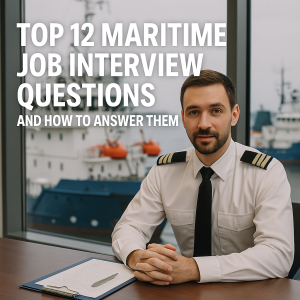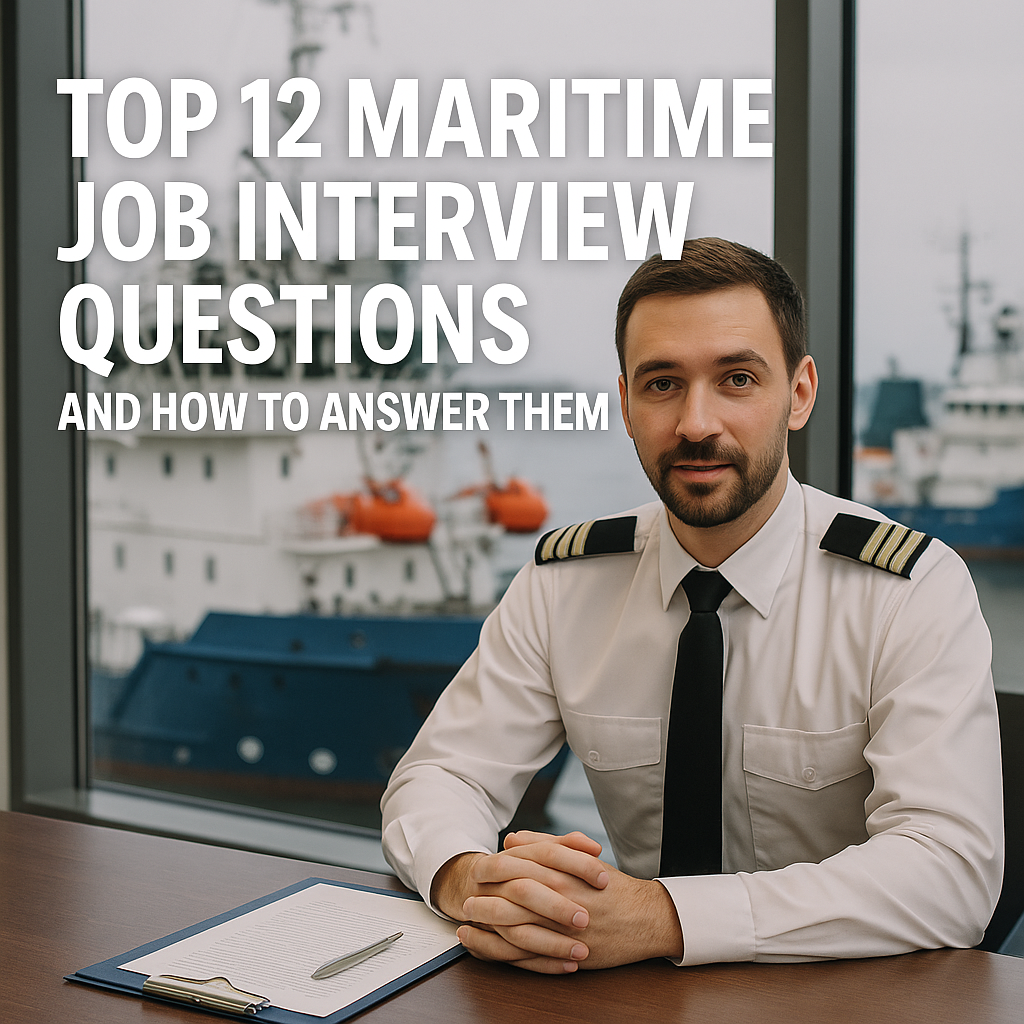
Preparing for a maritime job interview? Discover the top 12 questions asked by shipping companies and learn how to answer them with confidence. Includes real-world examples, industry insights, and expert tips to help cadets, officers, and seafarers succeed.
Anchoring Your Career in a Competitive Industry ⚓
Job interviews in the maritime sector are not just formalities—they are gateways to life-changing opportunities. Whether you’re a cadet applying for your first contract, an experienced officer moving to a new shipping line, or a shore-based professional seeking a role in port management, your ability to answer interview questions can determine your career trajectory. The maritime industry is vast, employing nearly 1.9 million seafarers globally (International Chamber of Shipping, 2023). Yet competition for positions is fierce, and employers seek more than just technical skills. They want resilience, teamwork, and compliance with international standards like STCW, MARPOL, and SOLAS.
This guide explores the top 12 maritime job interview questions—questions asked in real interviews across shipping companies, crewing agencies, and port organisations. More importantly, it provides structured approaches and examples to help you answer them effectively.
Why Interview Preparation Matters in the Maritime World
Unlike some industries, shipping has unique challenges: months away from home, multi-national crews, heavy machinery, and strict international compliance. Employers must be confident you are technically capable and psychologically ready. Poor preparation doesn’t just mean rejection; it can mean missed opportunities to join leading companies such as Maersk, MSC, or MOL, where experience can define future careers. Interviewers often check not only your knowledge of maritime conventions but also your communication skills. A misstep in an interview might raise concerns about your ability to respond clearly during emergencies at sea.
–
The Top 12 Maritime Job Interview Questions (and How to Answer Them)
1. Tell us about yourself and your maritime background
This is usually the opening question. Keep it structured: education → sea service → special skills → career goals.
Sample Answer:
“I graduated from the Maritime University of Gdynia in 2018 with a degree in Marine Engineering. My cadetship was with a container shipping line, where I gained hands-on experience with two-stroke MAN B&W engines. I completed contracts as a fourth engineer, focusing on maintenance of auxiliary machinery. My long-term goal is to progress to second engineer while expanding knowledge of green technologies like scrubbers and LNG systems.”
👉 Tip: Avoid rambling. Relate your background to the role you are applying for.
2. Why do you want to work with our company?
Employers test your motivation and whether you’ve done your research.
Sample Answer:
“I admire your company’s leadership in adopting alternative fuels, particularly the LNG-powered fleet expansion reported last year. I want to be part of a forward-looking company that values sustainability and invests in crew training.”
👉 Tip: Reference company initiatives—check their website, recent press releases, or IMO reports.
3. What do you understand by STCW, and why is it important?
The Standards of Training, Certification, and Watchkeeping (STCW) Convention is central to maritime jobs.
Sample Answer:
“STCW sets the minimum international standards for seafarer training and certification. Without it, ships would face inconsistencies in crew competence. Compliance ensures safety, reduces human error—the leading cause of maritime accidents according to EMSA—and guarantees that crew from different nations operate under the same framework.”
👉 Tip: Add a personal touch: explain how STCW training shaped your competence.
4. How would you handle a conflict with a multinational crewmate?
The maritime workplace is highly multicultural. Employers want emotional intelligence.
Sample Answer:
“On my last contract, I worked with 12 nationalities. When a disagreement arose about work priorities, I listened carefully, acknowledged differences, and referred to company procedures. We agreed to align with the chief engineer’s standing orders. I believe respect and reference to established protocols are key in resolving conflicts.”
👉 Tip: Use STAR (Situation, Task, Action, Result) method for examples.
5. What would you do if you discovered a safety violation on board?
This tests both integrity and knowledge of regulations like ISM Code and SOLAS.
Sample Answer:
“I would immediately address the unsafe act if it posed direct risk—for example, improper PPE usage. Then I would document and report it to the safety officer as per the ship’s Safety Management System (SMS). I see safety reporting not as fault-finding but as protecting the crew and vessel.”
👉 Tip: Show courage balanced with respect for hierarchy.
6. Describe a time when you dealt with an emergency at sea
Employers check for calmness under pressure.
Sample Answer:
“During my cadetship, a small engine room fire broke out due to oil leakage. I followed emergency procedures—raising the alarm, shutting fuel valves, and assisting in boundary cooling. The incident reinforced the importance of drills, which made our actions efficient and calm.”
👉 Tip: Link your story to drills, training, and teamwork.
7. How do you stay updated with maritime regulations and technology?
The industry is evolving rapidly (LNG, ammonia, digitalisation).
Sample Answer:
“I subscribe to Lloyd’s List and follow IMO circulars. I’ve also completed online modules on decarbonisation technologies from DNV Academy. Staying updated is essential because regulations—like the IMO’s CII and EEXI—directly affect ship operations and seafarer practices.”
👉 Tip: Mention specific sources (IMO, ICS, classification societies).
8. What are your strengths and weaknesses as a seafarer?
Be honest but strategic.
Sample Answer (Strength):
“I’m detail-oriented with machinery maintenance, which reduces unexpected breakdowns.”
Sample Answer (Weakness):
“I used to hesitate in giving instructions, but after my leadership training and onboard experience, I’ve grown more confident in managing junior ratings.”
👉 Tip: Always show how you are improving your weakness.
9. How would you act if the captain or chief officer gave an order you believed unsafe?
Testing integrity vs obedience.
Sample Answer:
“I would respectfully voice my concern, explaining why I considered the order unsafe, and suggest alternatives. If the order persisted, I would follow formal procedures for reporting while ensuring no immediate danger to life or the vessel.”
👉 Tip: Stress respect for hierarchy while upholding SOLAS “master’s overriding authority.”
10. Can you explain MARPOL and its relevance to your role?
MARPOL is a core convention on marine pollution.
Sample Answer:
“MARPOL regulates pollution from ships—covering oil, chemicals, sewage, garbage, and air emissions. As a fourth engineer, I ensured proper operation of the oily water separator and accurate entries in the Oil Record Book. Compliance protects both the marine environment and the company’s reputation, as PSC detentions often focus on MARPOL violations.”
👉 Tip: Tie it to real onboard practices.
11. How do you manage stress during long contracts at sea?
Seafarer wellbeing is a growing focus (see ISWAN reports).
Sample Answer:
“I maintain a routine—exercise, reading, and regular calls home. I also talk to shipmates openly, which helps build trust. On one long voyage, organising a weekly film night boosted morale for everyone.”
👉 Tip: Show awareness of mental health and resilience.
12. Where do you see yourself in five years in the maritime industry?
Employers want ambition aligned with loyalty.
Sample Answer:
“I see myself advancing to second engineer, having completed higher-level CoCs, and contributing to the company’s green initiatives. I’d also like to mentor cadets, sharing what I’ve learned.”
👉 Tip: Be realistic, align with career progression under STCW.
–
Beyond the Questions: Real-World Examples
-
Case Study 1: A Cadet at a Greek Shipping Company – A candidate who researched the company’s LNG fleet impressed the panel by referencing specific IMO decarbonisation goals.
-
Case Study 2: A Chief Officer in Singapore – Asked about conflict management, he described implementing the company’s SMS for dispute resolution, showing leadership under pressure.
Both examples underline one truth: specific, authentic answers beat generic responses.
Frequently Asked Questions
Do maritime job interviews differ from shore-based jobs?
Yes. They emphasise international conventions (STCW, MARPOL, SOLAS), emergency handling, and multicultural teamwork.
How should I dress for a maritime interview?
Smart business attire is best, even if applying for a sea role. It signals professionalism.
Are technical questions common?
Very. Engineers may be asked about OWS operations, deck officers about COLREGs. Review core knowledge before the interview.
Do companies expect perfect English?
No, but clarity is essential. Use simple, structured sentences. Maritime English (IMO Model Course 3.17) is the benchmark.
What mistakes should I avoid?
Rambling, criticising past employers, ignoring safety, or failing to show teamwork.
Conclusion: Charting a Confident Course 🚢
Maritime job interviews test far more than technical knowledge—they measure your safety culture, communication skills, and readiness for life at sea. Preparing structured answers to common questions is like plotting a safe navigation route: it reduces risk and increases your chance of reaching your destination.
Whether you’re a cadet dreaming of your first voyage or an officer aiming for promotion, use these 12 questions as your compass. With practice, self-awareness, and knowledge of maritime regulations, you can enter the interview room with confidence and leave it with opportunity.


tHANKS
An interesting guide, thanks